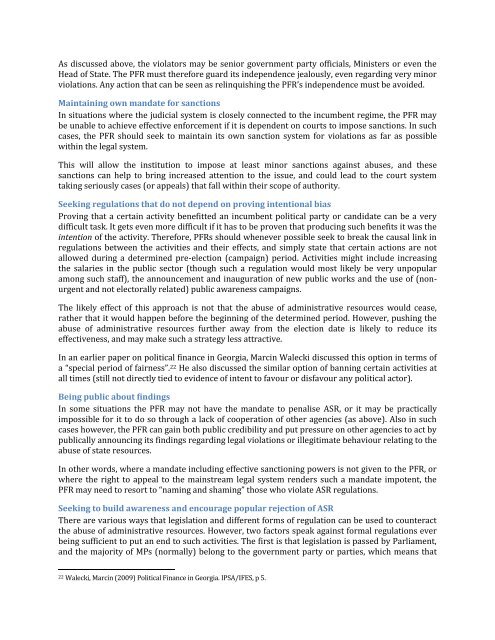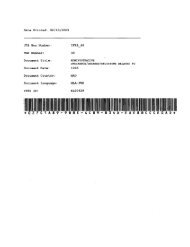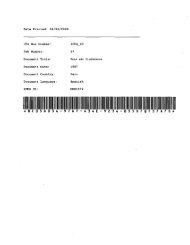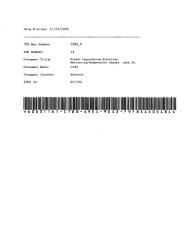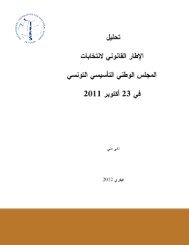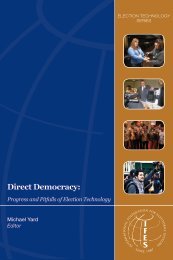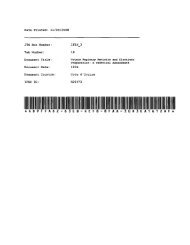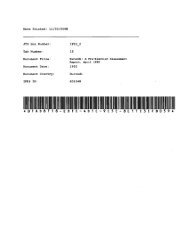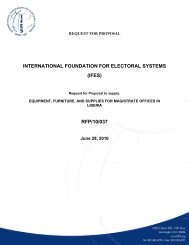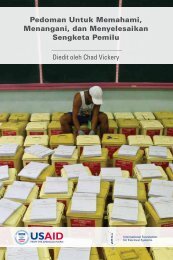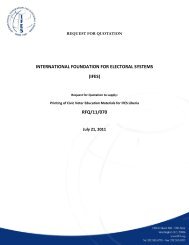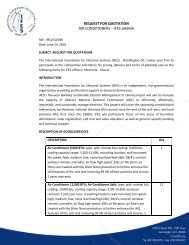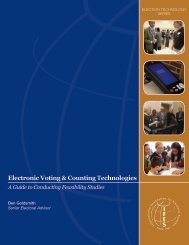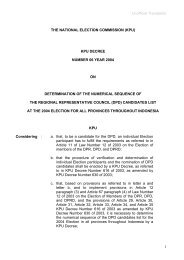ABUSE OF STATE RESOURCES - IFES
ABUSE OF STATE RESOURCES - IFES
ABUSE OF STATE RESOURCES - IFES
You also want an ePaper? Increase the reach of your titles
YUMPU automatically turns print PDFs into web optimized ePapers that Google loves.
As discussed above, the violators may be senior government party officials, Ministers or even the<br />
Head of State. The PFR must therefore guard its independence jealously, even regarding very minor<br />
violations. Any action that can be seen as relinquishing the PFR’s independence must be avoided.<br />
Maintaining own mandate for sanctions<br />
In situations where the judicial system is closely connected to the incumbent regime, the PFR may<br />
be unable to achieve effective enforcement if it is dependent on courts to impose sanctions. In such<br />
cases, the PFR should seek to maintain its own sanction system for violations as far as possible<br />
within the legal system.<br />
This will allow the institution to impose at least minor sanctions against abuses, and these<br />
sanctions can help to bring increased attention to the issue, and could lead to the court system<br />
taking seriously cases (or appeals) that fall within their scope of authority.<br />
Seeking regulations that do not depend on proving intentional bias<br />
Proving that a certain activity benefitted an incumbent political party or candidate can be a very<br />
difficult task. It gets even more difficult if it has to be proven that producing such benefits it was the<br />
intention of the activity. Therefore, PFRs should whenever possible seek to break the causal link in<br />
regulations between the activities and their effects, and simply state that certain actions are not<br />
allowed during a determined pre-election (campaign) period. Activities might include increasing<br />
the salaries in the public sector (though such a regulation would most likely be very unpopular<br />
among such staff), the announcement and inauguration of new public works and the use of (nonurgent<br />
and not electorally related) public awareness campaigns.<br />
The likely effect of this approach is not that the abuse of administrative resources would cease,<br />
rather that it would happen before the beginning of the determined period. However, pushing the<br />
abuse of administrative resources further away from the election date is likely to reduce its<br />
effectiveness, and may make such a strategy less attractive.<br />
In an earlier paper on political finance in Georgia, Marcin Walecki discussed this option in terms of<br />
a “special period of fairness”. 22 He also discussed the similar option of banning certain activities at<br />
all times (still not directly tied to evidence of intent to favour or disfavour any political actor).<br />
Being public about findings<br />
In some situations the PFR may not have the mandate to penalise ASR, or it may be practically<br />
impossible for it to do so through a lack of cooperation of other agencies (as above). Also in such<br />
cases however, the PFR can gain both public credibility and put pressure on other agencies to act by<br />
publically announcing its findings regarding legal violations or illegitimate behaviour relating to the<br />
abuse of state resources.<br />
In other words, where a mandate including effective sanctioning powers is not given to the PFR, or<br />
where the right to appeal to the mainstream legal system renders such a mandate impotent, the<br />
PFR may need to resort to “naming and shaming” those who violate ASR regulations.<br />
Seeking to build awareness and encourage popular rejection of ASR<br />
There are various ways that legislation and different forms of regulation can be used to counteract<br />
the abuse of administrative resources. However, two factors speak against formal regulations ever<br />
being sufficient to put an end to such activities. The first is that legislation is passed by Parliament,<br />
and the majority of MPs (normally) belong to the government party or parties, which means that<br />
22 Walecki, Marcin (2009) Political Finance in Georgia. IPSA/<strong>IFES</strong>, p 5.


